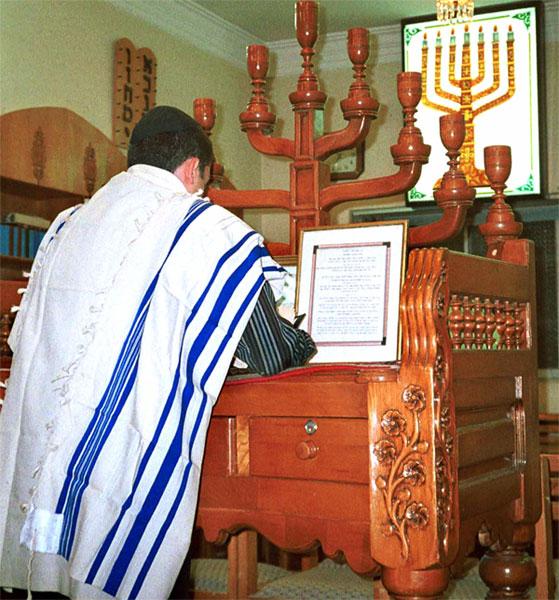Iranian Jew touts deep ties between Jews and Iran
An Iranian Jew prays in a synagogue in Shiraz, Iran, in this photo from 1999. Some 25,000 Jews still live in Iran. (Photo by the U.S. State Department via Wikimedia Commons.)
Iran called on Tuesday for more talks with the United Nations nuclear watchdog group, claiming that their current nuclear program is strictly peaceful.
That claim, though, is strongly rejected by the west and Israel. According to intelligence reports cited by the Associated Press, Israeli officials would not warn the United States if they decided to attack Iran’s nuclear facilities.
Roya Hakakian, author of “Assassins of the Turquoise Palace,” is an Iranian Jew with deep roots in both Israel and Iran. She argues neither country would even consider attacking the other if they recognized their deep, mutually beneficial roots.
Many people, she said, aren’t even aware that there are still Jews living in Iran.
“To become aware of the deep ties that these two countries share may not bring peace between the governments, but it will really effect, in my belief, the way in which the rhetoric is being shaped,” Hakakian said. “It’s important for both Jews here in America and in Israel, as well as fellow Iranians both inside and outside of Iran, to know what deep ties there have been.”
For example, during the Holocaust, Iran stood staunchly behind Jews trying to escape the genocide.
“Iran was a way-station for tens of thousands of Holocaust survivors on their way to other parts of the world,” she said. “Of those tens of thousands who arrived and stayed briefly, some of them decided to stay, because they just found that Iranians were a very warm people and they fell in love with the culture.”
Still, today, Iran is not a welcoming place for Jews. Hakakian admits it’s a place where you hide your Judaism.
But, in a more broad, historical sense, the Jewish community remains significant in Iran. She said there are between 15,000 and 30,000 Jews still living in Iran.
“Had the Iranian public not been friendly and tolerant toward them, their survivor would have been far more difficult than it is today,” she said. “Their fate would have been the same, say, as the Jews of Iraq and other parts of the Middle East.”
In the late 1960s, Hakakian said, anti-semitism grew so fierce in Iraq that Jews migrated out en masse. That never happened in Iran — a fact she attributes to the Iranian people’s welcome attitude toward Jews.
“It’s important for the people of the two countries to know that the enemy isn’t really the enemy, and that there are spheres of mutuality, as Martin Luther King once put, that we all share,” Hakakian said.
While the governments are not likely to view this history as a way to build bridges, Hakakian is hopeful, and optimistic, that the message will be receptive to the two countries’ people.
“I’m terribly hopeful, for pragmatic and altruistic reasons” that there won’t be some violent conflict between Israel and Iran — an eventuality that has seemed increasingly likely in recent months.
